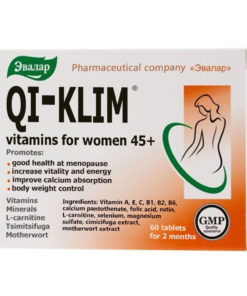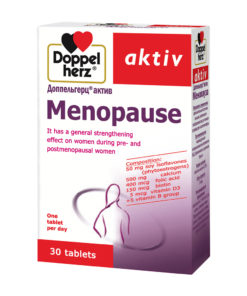$41.06
Ingredients: 1 sachet contains: inositol, folic acid; excipients: maltodextrin filler, vanilla flavoring, sucralose sweetener, anti-caking silica agent
Ingredients: 1 sachet contains: inositol, folic acid; excipients: maltodextrin filler, vanilla flavoring, sucralose sweetener, anti-caking silica agent. The properties of the product Fertin are determined by the properties of its constituent components (inositol and folic acid), due to which Fertina can improve reproductive function and correct metabolic disorders in women. Nutritional value per 1 sachet bag: carbohydrates – 2 g, proteins – <0.1 g, fats – <0.1 g. Energy value per 1 sachet bag: 8 kcal (33 kJ). Scope: Fernina Inositol 1000 mg Folic acid 100 µg (hereinafter referred to as Fertin) is recommended for use as a dietary supplement, an additional source of inositol and folic acid. Additional Information: The properties of the product Fertin are determined by the properties of its constituent components (inositol and folic acid). Due to its constituent components, Fertina contributes to the correction of metabolic disorders underlying ovarian dysfunction in women. Fertina can have a positive effect on reproductive function in women, because its components contribute to the normalization of ovarian function, improving the quality of oocytes and restoring the menstrual cycle. Fertin can be used as an aid in polycystic ovary syndrome (PCOS), as well as in assisted reproductive technology protocols (ART). Fertina can be used as an aid in the elimination of androgenic disorders in women, manifested by hirsutism, acne, excessive greasiness and hair loss, and androgenic obesity. The action of the components of Fertin: INOSITE Inositol (Myo-Inositol, Vitamin B8) is a vitamin B factor. The largest amounts of inositol are contained in citrus fruits, whole grains, dried fruits, peanuts, wheat germ, beans, yeast, and vegetable greens. Fruits and fresh vegetables contain more inositol than frozen, canned, and pickled foods. Inositol has demonstrated its benefits in patients with irregular menstruation. Inositol intake for 6 months allowed to reduce the number of anovulatory cycles by 4 times. This effect is associated with the positive effect of inositol on the processes in the ovaries, which involve luteinizing hormone (UH) and follicle-stimulating hormone (FSH) [1]. Inositol has shown positive results when prescribing as part of pregravid preparation before ART. Inositol improved the functional status of oocytes in patients with PCOS in ART protocols [2]. The addition of inositol to folic acid in patients without PCOS undergoing superovulation stimulation cycles in IVF protocols allows reducing the number of mature oocytes used and reducing the dosage of recombinant FSH without reducing the number of clinical pregnancies, which can reduce the risk of ovarian hyperstimulation syndrome [3]. The results of randomized clinical studies suggest the use of inositol to improve ovarian function, as well as the correction of metabolic and hormonal disorders in PCOS [4]. Hyperinsulinemia characteristic of PCOS, while maintaining the sensitivity of the ovarian tissue to insulin, leads to the development of hormonal disorders, an increase in the number of androgens, which manifests itself as hirsutism, acne and androgenic obesity. Inositol may contribute to the elimination of androgenic disorders. Patients who used inositol demonstrated a decrease in LH, prolactin, testosterone, insulin in plasma, LH / FSH ratio, restoration of insulin sensitivity (glucose / insulin ratio and HOMA index), menstrual function, and hirsutism and acne decreased after 6 months therapy [5,6]. Another study showed a significant reduction in triglycerides, insulin, and the restoration of ovulation [7]. Inositol reduces the risk of insulin resistance, diabetes, overweight and obesity, indirectly increasing insulin receptor sensitivity and stimulating the processing of carbohydrates and fats to maintain the energy metabolism of the cell [8]. Folic acid is a water-soluble vitamin B (vitamin B9). Folic acid plays an important role in the metabolism of amino acids, the synthesis of protein and nucleic acids (primarily in the production of DNA and RNA) and the repair of chromosomes. Therefore, it is very important for normal cell division and tissue growth. Folic acid is found in green vegetables with large leaves, in the liver, eggs and legumes, while its content in fruits (with the exception of oranges), meat and milk is rather low. During cooking, it almost completely collapses to folate (90%) in just a few minutes. With a folic acid deficiency, during preparation for pregnancy and during pregnancy, an egg pathology, placental abruption (both partial and absolute), missed abortion, spontaneous abortion (miscarriage) can develop; congenital malformations in a child: anencephaly, nerve defect
Dosage
Immediately before use, dissolve 1 sachet of Fertin in 200 ml of water at room temperature and take it inside. It is recommended that adults take 1 sachet a day during a meal. The recommended daily intake contains: Content in 1 sachet bag: Inositol 1000 mg Folic acid 100 mcg Reception duration 1 month. Determination of the daily dose and duration of taking the product Fertin can be made by the doctor individually and differ from the recommended dose in this package leaflet. Do not exceed the dose recommended by your doctor.
| Weight | 0.150 kg |
|---|
Be the first to review “FERTINA INOSITE 1000MG FOLIC ACID 100MKG N30 PACKAGES-SASHE FOR 3G” Cancel reply
Related products
Women Health
Women Health
Women Health
Women Health
Women Health












Reviews
There are no reviews yet.